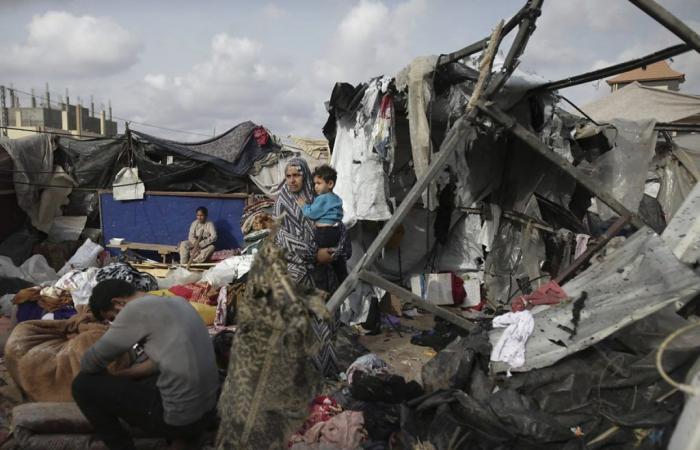Keystone-SDA
This content was published on
June 24, 2024 – 2:31 p.m.
(Keystone-ATS) Bombings targeted the Gaza Strip on Monday, after the announcement by the Israeli Prime Minister that the “intense” phase of the fighting was “about to end”, particularly in Rafah. But the war against Hamas continues, he adds.
The Islamist movement responded Monday that any agreement must “include a permanent ceasefire and a complete Israeli withdrawal” from Gaza, conditions that Israel has always rejected.
The Israeli army launched a ground offensive in Rafah, a border town with Egypt, at the beginning of May with the aim of destroying Hamas, author of a bloody attack on Israel on October 7, which sparked the war in the strip. from Gaza.
The Prime Minister, Benjamin Netanyahu, under very strong pressure from public opinion, repeated on Sunday that “the objective” was “to recover the hostages” held in Gaza and to “uproot the Hamas regime”, in place since 2007, in an interview with Israeli channel Channel 14.
“The intense phase of the fighting against Hamas is about to end (…) This does not mean that the war is about to end but the war in its intense phase is about to end in Rafah” , said Mr. Netanyahu.
Lebanon
The war has also caused a military escalation on Israel’s northern border with Lebanon, between the Israeli army and Lebanese Hezbollah, which has raised fears of an extension of the conflict.
“After the end of the intense phase, we will be able to redeploy some forces towards the north, and we will do so, mainly for defensive purposes, but also to bring the (displaced) inhabitants back to their homes,” the first added on Sunday. minister.
The exchanges of fire between the army and Hezbollah, a powerful Islamist movement allied with Hamas, armed and financed by Iran, led to the displacement of tens of thousands of residents of the border areas of southern Lebanon and northern Lebanon. ‘Israel.
“There will be a war,” predicts Helene Abergel, a resident of Kiryat Shmona, in northern Israel, who is staying in a Tel Aviv hotel. “A war must take place to push Hezbollah away from the border,” adds this 49-year-old woman met by AFP.
“No safe place”
While the relationship between Mr. Netanyahu and the United States is experiencing an episode of tension after Israeli criticism of delays in American arms deliveries, Israeli Defense Minister Yoav Gallant arrived in Washington for talks that he described as “crucial” for the rest of the war.
On Sunday, Mr Netanyahu said this “dispute” with Washington would be “resolved in the near future”.
In the Gaza Strip, besieged by Israel, artillery fire targeted Rafah on Monday as well as the Palestinian camp of Nousseirat, in the center, and the Zeitoun neighborhood of Gaza City, in the north, where fighting broke out. been reported, according to witnesses.
According to Civil Defense spokesperson Mahmoud Basal, two medical professionals were killed in an airstrike on Al-Daraj hospital in Gaza City, including Hani Al-Jafarwari, the director of the ambulance service. and emergencies at the Gaza Ministry of Health.
According to this ministry, at least “500 health professionals have been killed directly” since the start of the “Israeli aggression”.
The army announced that it was continuing its “targeted operations” in the Rafah sector and having “eliminated armed terrorists” and “dismantled tunnel entrances”.
“Drive out this government”
In his country, the prime minister is increasingly criticized for his conduct of the war and his failure to obtain the release of the last hostages.
On Saturday in Tel Aviv, more than 150,000 people, according to organizers, demonstrated to demand early elections and the return of hostages, during the largest gathering since the start of the war.
“The only way to achieve change here is to oust this government, to oust the extremists,” said Maya Fischer, a 36-year-old protester. “It is time to end the war, bring back the hostages and save lives, both on the Israeli and Palestinian sides.”
Tens of thousands dead
The war was sparked on October 7 by an attack carried out by Hamas commandos in southern Israel, which resulted in the deaths of 1,194 people, mostly civilians, according to an AFP count based on official data. Israelis.
Of 251 people kidnapped, 116 are still held hostage in Gaza, of whom 41 are dead, according to the Israeli army.
In response, Israel promised to destroy Hamas, which it considers a terrorist organization along with the United States and the European Union. His army launched an offensive in the Palestinian territory which has so far left 37,598 dead, mostly civilians, according to data from the Health Ministry of the Hamas-led Gaza government.
The war also caused a massive population displacement in the territory of 2.4 million inhabitants. More than a million people are constantly on the move in the hope of finding refuge in the Gaza Strip while “no place there is safe”, underlined the World Health Organization.






